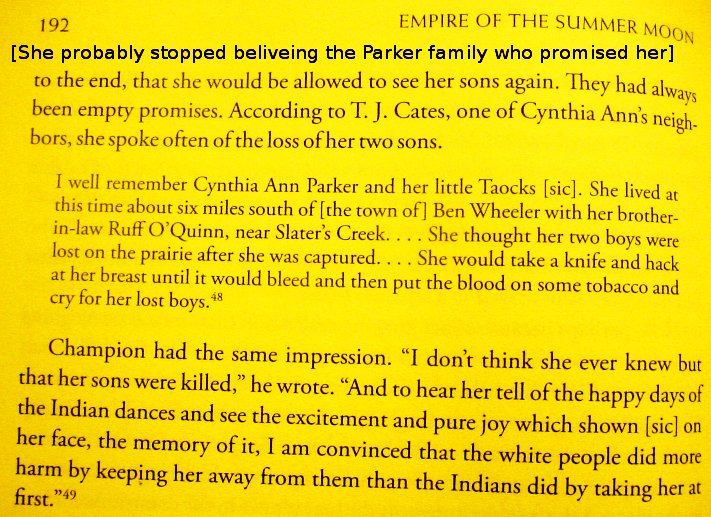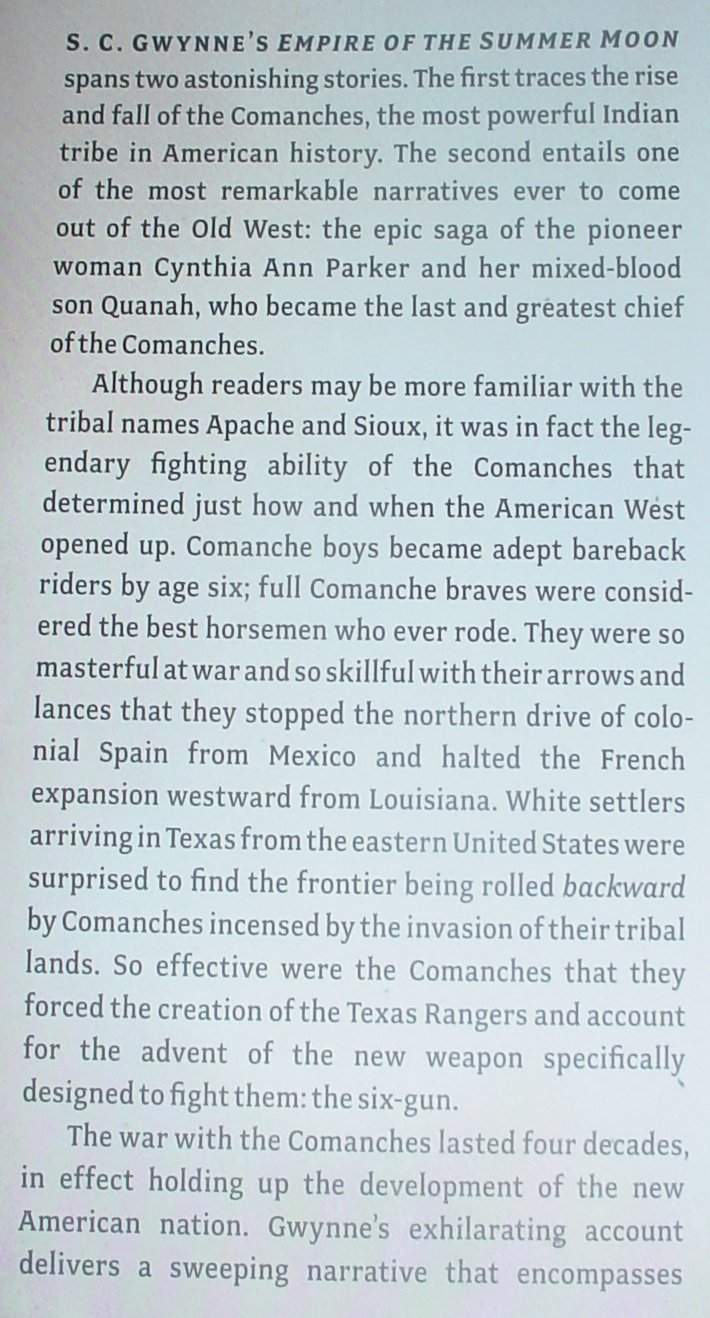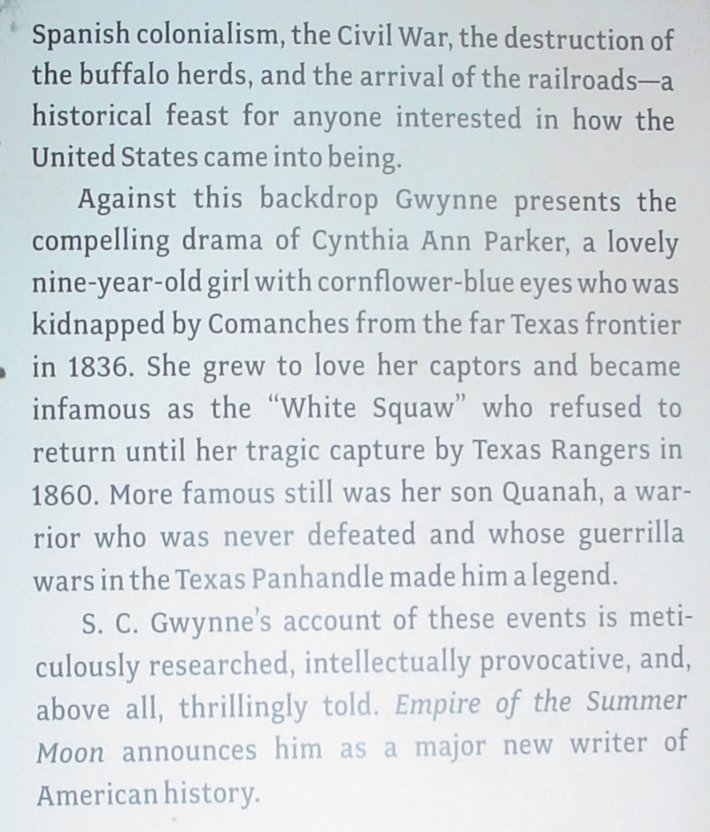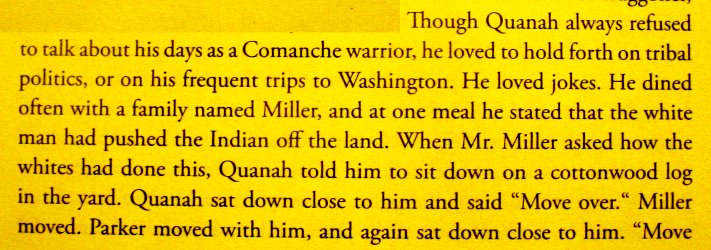I picked up this book in the bookstore.
The cover featured a plains Indian with feathers and beads and
everything else. It was interesting, so I opened the thing. This was
the blurb on the inside flaps of the jacket:
That was interesting, so I opened the
thing at random and read about
a peace treaty
in the old
west that actually worked. That was enough. I had to read this
book.
It really is extremely interesting. Despite what the blurb says, the
book starts with the Comanche being a relatively small tribe of small
people relegated to the rough parts (poor hunting grounds) of Colorado
by stronger tribes, maybe 400 years ago or so. Then when the Spanish
introduced horses, they did a
better job of learning how to use the beasts than anybody else, and
became the new dominant tribe of the area between what is now Mexico
and
Oklahoma, all the way from where the forests end to the deserts of New
Mexico. The above story is told in some detail, and covers maybe 100
pages or so.
Gwynne explains such things as why
Mexico gave Texas away. It
seems that Comanche raids were making it uninhabitable, so they didn't
argue too much when somebody else wanted it. A generation later
Washington took over, but on the plains all that didn't matter. That
was Comancheria to anybody that was there. The Manifest Destiny thing
was a driving force in Washington at the time, so
they (we?) opened the frontier to settlement. The Parkers
were
part of that. The Comanche were the kind of people that kept themselves
busy all summer long doing things like hunting and raiding, so it was
probably inevitable that the Parker fort would get raided next at some
point. That's where Cynthia Ann came into the story, old enough to be
useful to the Comanche after the raid, and young enough that the
Indians didn't just kill her, which they usually did to adults that
didn't escape during
raids.
The bulk of the book really is the
story of Cynthia Ann and Quanah Parker, with plenty of asides that
explain the factors surrounding their lives. The author fleshes out
what is known from Cynthia Ann by adding a couple of other parallel
stories that
seem to have been better written. This is particularly interesting
because there isn't much written information about what it was like to
be a plains Indian of those days. Most of what we have are the few
written accounts from
people like Cynthia Ann that were brought back into the white world
after spending time as Indians. There might be three or four of those,
and I think at least two of them are built into this book. The story is
told with original source material quoted and footnoted extensively.
This quote affected me more than most:

It turns out that her two sons were the
only two Indians that escaped that raid where she was recaptured. One
of them died only a few years later, but the other went on to be a
remarkable man. He led one of the last bands of Indians on the southern
plains to move onto a reservation, and the story is gripping reading.
Even though we already know how it turned out, still the game of cat
and mouse that is played out on the pages kept me reading. Since they
couldn't beat him in battle, the buffalo hunt was dreamed up to tip the
scales in the U. S. Army's favor. They surrendered only after there was
no meat left to
hunt. When Quanah was
finally put on a reservation they found out he was Cynthia Ann Parker's
son when he asked "what happened to my mother?"
The last 25 pages or so tells Quanah
Parker's reservation life. It's a better story than you'd expect. The
guy became a famous cattle rancher and notable speaker, with the title
Principal Chief of the Comanches, which he took seriously. His home
was big and comfortable
and he entertained many people there, including such notables as
President Teddy Roosevelt and Geronimo. I love the way he explained to
a visitor how
the white man took over Texas:
Quanah Parker died in 1911, doing about
as well as anybody can at leaving no material trace behind. Not much
money, not much
debt, but more than a few stories like this one for those who want to
know more about how our world used to be. The government retired the
title Principal Chief of the Comanches after that, so nobody has
held it since. So much has changed it seems unlikely there
will be another like him again soon.





